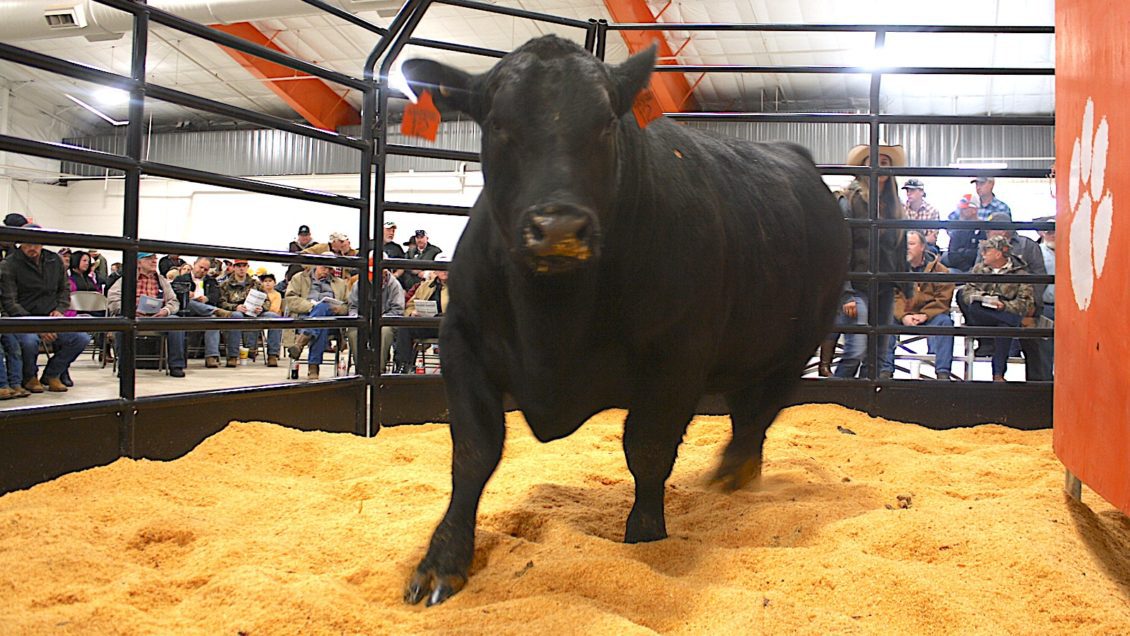
CLEMSON — It’s hard to put a price tag on the value of top-quality genes in the beef cattle business, but a $22,000 yearling bull makes a pretty good statement.
That was the record price drawn for a bull auctioned at the Clemson University Bull Test auction Feb. 1, the culmination of a months-long evaluation of how efficiently dozens of bulls from across the Southeast gained weight.
“Feed is the single largest expense a cattle producer has, so maximizing a herd’s genetic ability to convert feed into meat is a clear advantage,” said Steve Meadows, who directs Clemson University annual bull test and auction.
“Identifying those genetic characteristics is the whole purpose of a bull test and we’ve seen bull performance improve dramatically over the 44 years we’ve done this,” Meadows said. “This is the highest sale price we’ve ever had at either of our annual bull tests — both at the Simpson Research and Education Center at Clemson and at our Edisto REC near Blackville. It speaks a lot about the level of quality that cattlemen from South Carolina and our neighboring states are breeding into the cattle in our region.”
That quality drew cattle producers from three states to Clemson’s T. Ed Garrison Arena cattle complex to study the results of the test and decide whether to add its bulls to their herds. Prior to the sale, farmers examine all the bulls and heifers that will be auctioned, paying careful attention to the data on each bull that Clemson provides in a printed catalog.

During the test, monitoring systems track each bull’s feed intake and measure weight gain and other performance indicators, such as height. The data is used to create indexes that offer a glimpse at how the bulls’ offspring may perform.
“You can’t manage what you can’t measure,” said Clemson Extension animal science specialist Brian Bolt. “Cattlemen are trying to achieve optimum production with minimal wasted inputs. It boils down to this: Plan, document, learn, rinse and repeat.”
“The bull test data helps cattle producers make the best choices for their herds, whether their goal is to increase performance, improve feed efficiency, lower birth weights or whatever,” Meadows said. “Achieving the goal starts with solid information.”
At a dinner the evening before the Feb. 1 sale recognized the consignors of the top bulls in the test:
- Chuck Broadway of Broadway Cattle Farm in Monroe, N.C., took top honors for both the highest average daily gain — a whopping 6.04 pounds per day during the test — and the top overall performance index.
- The award for the bull with the highest weight per day of age — 3.83 pounds for every day since the critter’s birth — went to W.R. McCleod of Black Crest Farm in Sumter, S.C.
- John Cook of Cook Cattle Service in Buckhead, Ga., took the award for the bull with the highest RFI, or residual feed index.

“The RFI measures efficiency in feed conversion. It tells the cattle producer more than just growth rate alone,” said Matthew Burns, leader of the Clemson Extension Service Livestock and Forages Program. “We urge producers to use a variety of measurements that will help them meet the specific needs in their operation. Ultimately that’s what will lead to a more profitable business.”
The Clemson Bull Test, held each winter at the Simpson REC with an auction at Garrison Arena, tests bulls on a 75-day diet of feed grain like that fed to cattle in a feedlot before processing. Clemson also operates an annual grass-fed bull test, now in its 39th year, at the Edisto REC that measures the animals’ efficiency in gaining weight on pasture.
Cattle breeders enter their animals into the test on consignment. Visitors are welcome without charge; prospective buyers must register in advance.
The record-setting $22,000 Angus bull was consigned by Edisto Pines of Leesville, S.C. The bull was purchased by Grimmius Cattle Company of Hanford, Calif.
The overall average price for bulls of all breeds was $4,197 — also a sale record as well for the Clemson Extension Bull Sale. By breed, 27 Angus bulls averaged $4,333, two Simmental averaged $4,750, five SimAngus averaged $4,260, two Herefords averaged $2,650 and two Gelbvieh averaged $3,200.
Following the bull sale, 12 open heifers were offered to buyers. The top pen, consigned from Diamond S Farms of Clinton, S.C., sold for $1,625 a head to Caldwell Farms of Enoree, S.C.
END
Get in touch and we will connect you with the author or another expert.
Or email us at news@clemson.edu

